


"Today we will make a formal decision to declare a Russian diplomat accredited in Croatia a persona non grata," Croatian Prime Minister Andrej Plenkovic said, adding that Croatia was thus showing solidarity with the UK in accordance with the conclusions of a recent European Union summit.
Plenkovic said the decision was made following consultations with relevant ministries, Parliament Speaker Gordan Jandrokovic and President Kolinda Grabar Kitarovic.
"This is a political message of solidarity, given the character of the attack in the UK which is our ally and partner in the EU and NATO," Plenkovic said, declining to comment on the possibility of Moscow responding in a reciprocal fashion and reveal the name of the Russian diplomat to be expelled.
Plenkovic also extended his condolences to Russia following a terrible fire that broke out in a shopping and entertainment mall in Kamerovo, Siberia, killing at least 64 people. Plenkovic said he had sent a letter of condolence to Russian Prime Minister Dimitry Medvedev.
Prime Minister Andrej Plenkovic said on Monday there was no need to state the name of the Russian diplomat Croatia decided to expel as a sign of solidarity with the United Kingdom over the poisoning of former Russian double agent Sergei Skripal in the UK.
"The Croatian Foreign and European Affairs Ministry talked to the Russian Embassy and this was conveyed to them. This is the level of diplomats, but the expelled diplomat is not the ambassador," Plenkovic briefly said.
Prime Minister and Croatian Democratic Union (HDZ) leader Andrej Plenkovic said on Monday that the process of ratifying the Istanbul Convention would go ahead and that he and his government clearly said in the interpretive statement accompanying the ratification bill how Croatia understood the convention, dismissing claims by some political stakeholders that interpretive statements are worthless.
"We said very clearly in the interpretive statement accompanying the bill how Croatia understands the convention's content. According to our law, interpretive statements are those in which Croatia expresses its interpretation. I am saying that because in our public arena there are many who are aspiring to be political stakeholders and who have said that interpretive statements are worthless. That reveals their utter lack of knowledge," Plenkovic told a press conference in Government House.
He said that ratification of the convention with the interpretive statement removed any fear or incorrect interpretation of the convention, which, he added, did not contain any hidden traps that could lead to a redefinition of marriage or the legal obligation to introduce a third gender.
"Claims that the Istanbul Convention will lead to a society that will recognise Parent 1 and Parent 2 are deceitful. That isn't true and hasn't happened in Germany nor in Italy. Our colleagues from the European People's Party in the German or Italian parliaments did not have any problem voting for the convention," Plenkovic said.
He also said that it was not true that the HDZ had changed its political stance. "That's not true and those claims have no grounds," he said.
The PM recalled that during the term of an HDZ-led government in the period until 2009, Croatian representatives had worked on preparing the convention and that during the term of the next, HDZ-led government, from 2009 to 2011, they had worked on the text of the convention.
He added that when the HDZ was in the opposition it had criticised the Social Democratic Party (SDP)-led government for not ratifying the convention.
Plenkovic said that the ratification of the Istanbul Convention was part of the HDZ's election platform and of the government's programme of legislative activities.
He underscored that the ratification of the convention was aimed at improving the legislative, operational, institutional and financial framework to protect women against violence and domestic violence.
Commenting on Saturday's protest against the convention, Plenkovic said that Croatia was a democracy and that he accepted the freedom of expression of all stakeholders in society. He added, however, that any debate should be backed by arguments based on facts and respect for all those participating in it.
He said that the ratification process would continue and that as prime minister and HDZ leader, he would not allow that issue to be exploited for some other political goals of individuals and groups.
Text: Hina